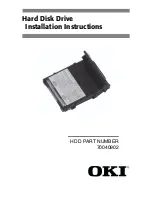
SATA Interface
4.3.3
S.M.A.R.T. commands
S.M.A.R.T. provides near-term failure prediction for disk drives. When S.M.A.R.T. is enabled, the drive monitors
predetermined drive attributes that are susceptible to degradation over time. If self-monitoring determines that a failure is
likely, S.M.A.R.T. makes a status report available to the host. Not all failures are predictable. S.M.A.R.T. predictability is
limited to the attributes the drive can monitor. For more information on S.M.A.R.T. commands and implementation, see the
Draft ATA-5 Standard.
SeaTools diagnostic software activates a built-in drive self-test (DST S.M.A.R.T. command for D4
H
) that eliminates
unnecessary drive returns. The diagnostic software ships with all new drives and is also available at:
This drive is shipped with S.M.A.R.T. features disabled. Users must have a recent BIOS or software package that supports
S.M.A.R.T. to enable this feature. The table below shows the S.M.A.R.T. command codes that the drive uses.
Table 9 S.M.A.R.T. commands
Code in features register
S.M.A.R.T. command
D0
H
S.M.A.R.T. Read Data
D2
H
S.M.A.R.T. Enable/Disable Attribute Autosave
D3
H
S.M.A.R.T. Save Attribute Values
D4
H
S.M.A.R.T. Execute Off-line Immediate (runs DST)
D5
H
S.M.A.R.T. Read Log Sector
D6
H
S.M.A.R.T. Write Log Sector
D8
H
S.M.A.R.T. Enable Operations
D9
H
S.M.A.R.T. Disable Operations
DA
H
S.M.A.R.T. Return Status
Seagate Desktop HDD Product Manual, Rev. A
28
Note
If an appropriate code is not written to the Features Register, the
command is aborted and 0
x
04 (abort) is written to the Error register.


































